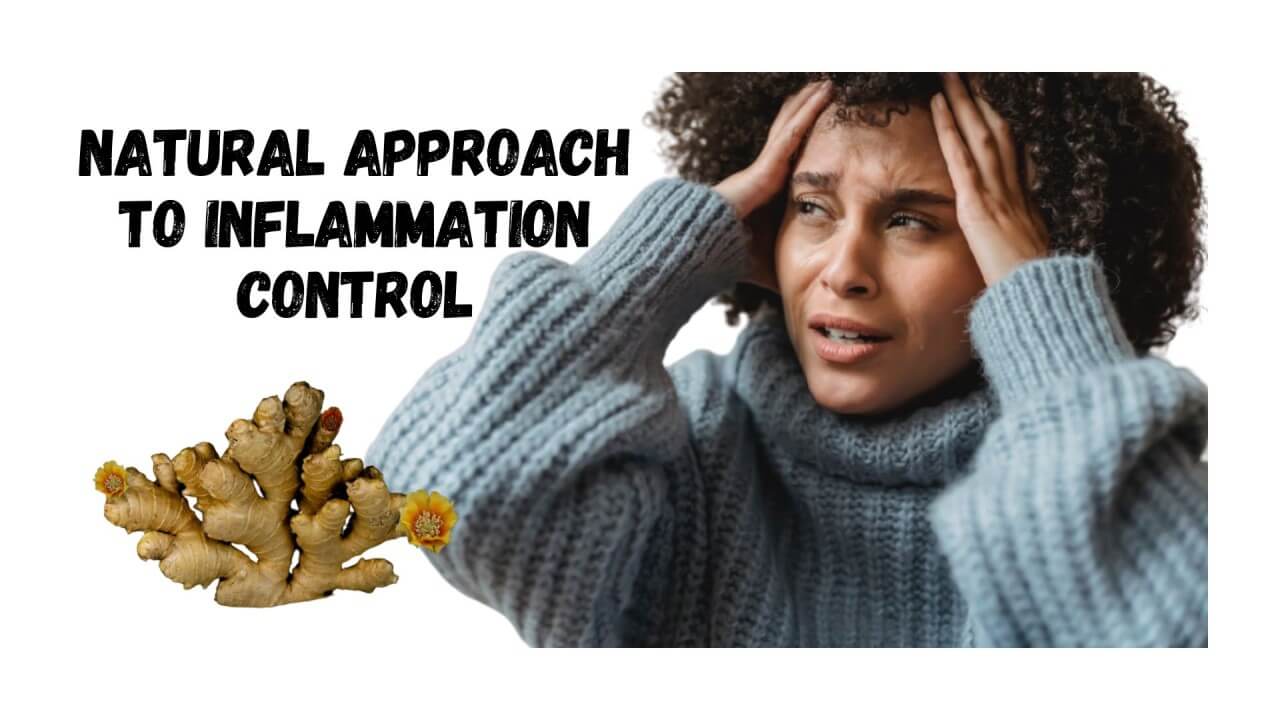In recent years, there has been growing interest in natural remedies for managing inflammation, especially among individuals with autoimmune conditions. One such remedy that shows promise is ginger. Let’s delve into the research and explore how ginger can be a valuable addition to your wellness toolkit.
1. What Is Ginger?
Ginger (Zingiber officinale) is a flowering plant native to Southeast Asia. Its rhizome (the underground stem) has been used for centuries in traditional medicine for its various health benefits.
Ginger (Zingiber officinale) is indeed a remarkable plant with a rich history of use in traditional medicine. Its rhizome, which is the underground stem, contains bioactive compounds that contribute to its health-promoting properties. Let’s explore some key aspects of ginger:
Anti-Inflammatory Properties:
- Ginger contains potent anti-inflammatory compounds, such as gingerols and shogaols. These compounds help reduce inflammation by inhibiting certain enzymes and pathways involved in the inflammatory response.
- For individuals with autoimmune diseases, managing inflammation is crucial. Ginger’s natural anti-inflammatory effects may offer support in this regard.
Digestive Benefits:
- Ginger has been traditionally used to alleviate digestive discomfort. It can help relieve nausea, bloating, and indigestion.
- Some studies suggest that ginger may protect against gastric ulcers and promote healthy gut function.
Pain Relief:
- Due to its anti-inflammatory properties, ginger may help reduce pain associated with conditions like osteoarthritis and rheumatoid arthritis.
- Consuming ginger regularly may provide mild pain relief and improve joint mobility.
Immune System Support:
- Ginger’s immune-modulating effects may benefit individuals with autoimmune diseases. It helps regulate immune responses without overstimulating the immune system.
- Remember that autoimmune diseases involve an abnormal immune response, so maintaining a balanced immune function is essential.
How to Incorporate Ginger:
- Fresh ginger root can be grated and added to teas, soups, stir-fries, and curries.
- Ginger supplements are also available, but it’s essential to consult with a healthcare provider before starting any new supplement regimen.
Precautions:
- While ginger is generally safe, some individuals may experience mild side effects like heartburn or stomach upset.
- Pregnant individuals should consult their healthcare provider before using ginger supplements.
Remember that individual responses to ginger can vary, and it’s essential to consider your specific health needs and any existing medical conditions. Always seek professional advice when incorporating new herbs or supplements into your wellness routine. 🌿🌟
2. Ginger and Neutrophils: A New Perspective
A recent study sheds light on ginger’s impact on neutrophils, a type of white blood cell involved in the immune response. Neutrophils play a crucial role in inflammation, but excessive activation can contribute to autoimmune diseases. The study found that ginger supplements may influence neutrophils, making them less prone to a process called NETosis.
Let me provide you with a detailed explanation based on recent research.
Ginger’s Impact on Neutrophils and NETosis:
A recent study has investigated the effects of ginger supplements on a specific type of white blood cell called neutrophils. Neutrophils are critical components of our immune system, playing a key role in inflammation and defense against infections. However, excessive activation of neutrophils can contribute to autoimmune diseases.
The study focused on a process known as neutrophil extracellular trap (NET) formation, commonly referred to as NETosis. NETs are microscopic spider web-like structures that are released by neutrophils. These structures play a dual role: they help trap and neutralize pathogens (such as bacteria) but can also contribute to inflammation and clotting.
Here’s what the study found regarding ginger’s impact:
Ginger Supplementation and Neutrophils:
- Healthy individuals who consumed ginger supplements experienced changes in their neutrophils.
- Specifically, ginger consumption made neutrophils more resistant to NETosis.
Why Is This Important?
- NETosis is associated with various autoimmune diseases, including lupus, antiphospholipid syndrome, and rheumatoid arthritis.
- By reducing NETosis, ginger may help control inflammation and alleviate symptoms in people with these conditions.
Biological Mechanism:
- In a clinical trial, participants took a ginger supplement daily for seven days (equivalent to 20 mg of gingerols per day).
- The ginger supplement boosted a chemical called cAMP inside the neutrophils.
- Elevated cAMP levels inhibited NETosis in response to disease-relevant stimuli.
Implications:
- This research provides evidence for the anti-inflammatory properties of ginger in humans.
- Ginger’s natural compounds may help restrain NETosis, potentially benefiting individuals with autoimmune diseases.
In summary, ginger supplements appear to influence neutrophils, making them less prone to NETosis. This finding suggests that incorporating ginger into your diet or using ginger supplements may have potential benefits for controlling inflammation associated with autoimmune conditions.
Remember to consult with a healthcare professional before starting any new supplements, especially if you have existing health conditions or are taking medications. 🌿🌟
3. NETosis: The Culprit in Autoimmune Inflammation
NETosis refers to the formation of structures known as neutrophil extracellular traps (NETs). These NETs are composed of DNA material combined with proteins and can boost inflammation and clotting. In autoimmune conditions like lupus, antiphospholipid syndrome, and rheumatoid arthritis, excessive NETosis exacerbates symptoms.
Let’s delve into the details of NETosis, which is a fascinating process involving neutrophils and their extracellular traps.
What Is NETosis?
- NETosis refers to a specialized mechanism by which neutrophils (a type of white blood cell) release neutrophil extracellular traps (NETs).
- These NETs are composed of a combination of DNA, histones, and various proteins.
- Unlike other cell types, neutrophils sacrifice themselves during NETosis by expelling their nuclear DNA and other contents into the extracellular space.
Formation of NETs:
When neutrophils encounter pathogens (such as bacteria, fungi, or viruses), they undergo NETosis.
The process involves the following steps:
- Activation: Neutrophils recognize the threat and become activated.
- Chromatin Decondensation: The nuclear DNA undergoes decondensation, unraveling and becoming accessible.
- Release of NETs: The neutrophil releases NETs into the surrounding environment.
- Composition: NETs consist of DNA strands coated with histones and decorated with antimicrobial proteins (such as defensins and myeloperoxidase).
Functions of NETs:
Pathogen Trapping: NETs act like sticky webs, trapping and immobilizing pathogens.
Antimicrobial Activity: The antimicrobial proteins within NETs help kill the trapped pathogens.
Inflammation and Clotting: However, NETs can also contribute to inflammation and clotting.
- Excessive NETosis can lead to an exaggerated immune response, which is problematic in certain conditions.
Role in Autoimmune Diseases:
In autoimmune conditions such as lupus, antiphospholipid syndrome, and rheumatoid arthritis, NETosis exacerbates symptoms.
Here’s how:
- Lupus: NETs contribute to the formation of autoantibodies and immune complexes, leading to tissue damage.
- Antiphospholipid Syndrome: NETs interact with phospholipids, promoting clot formation.
- Rheumatoid Arthritis: NETs activate immune responses and contribute to joint inflammation.
Therapeutic Implications:
- Researchers are exploring ways to modulate NETosis for therapeutic purposes.
- Ginger, as mentioned in the previous study, may influence neutrophils and reduce NETosis, potentially benefiting individuals with autoimmune diseases.
In summary, NETosis involves the release of NETs by neutrophils, which can both trap pathogens and contribute to inflammation and clotting. Understanding this process is crucial for managing autoimmune conditions and developing targeted therapies. 😊 .
4. How Ginger Works Against Inflammation
During a clinical trial, healthy participants took a ginger supplement daily for a week (20 mg of gingerols/day). The researchers observed an increase in a chemical called cAMP within the neutrophils. Elevated cAMP levels hindered NETosis when exposed to triggers associated with certain diseases. In other words, ginger made neutrophils less prone to forming NETs.
Let’s dive into the details of the clinical trial that explored the effects of ginger supplementation on neutrophils and NETosis.
Clinical Trial Overview:
- Participants: Healthy individuals volunteered for the study.
- Intervention: Participants took a ginger supplement daily for seven days.
- Dosage: The ginger supplement provided 20 mg of gingerols per day.
- Focus: Researchers aimed to understand how ginger influences neutrophils and their response to disease-related triggers.
Neutrophils and cAMP:
- Neutrophils: These are a type of white blood cell involved in the immune response.
- cAMP (Cyclic Adenosine Monophosphate): A chemical messenger within cells that plays a crucial role in signal transduction.
- Role of cAMP: Elevated cAMP levels can have various effects on cell behavior, including inhibiting certain processes.
The Findings:
Increased cAMP Levels: After the seven-day ginger supplementation, researchers observed an increase in cAMP levels within the neutrophils.
NETosis Inhibition: Elevated cAMP hindered a process called NETosis.
- NETosis is the formation of neutrophil extracellular traps (NETs), which can contribute to inflammation and clotting.
- By inhibiting NETosis, ginger made neutrophils less prone to forming NETs.
Implications and Significance:
Anti-Inflammatory Properties: Ginger’s impact on neutrophils suggests that it has anti-inflammatory properties.
Autoimmune Diseases: Excessive NETosis is associated with autoimmune conditions like lupus, antiphospholipid syndrome, and rheumatoid arthritis.
- Ginger’s ability to reduce NETosis may be beneficial for individuals with these conditions.
Limitations and Further Research:
- While this study provides valuable insights, more research is needed to understand the long-term effects of ginger supplementation.
- Individual responses may vary, and other factors (such as diet, genetics, and overall health) could influence the results.
In summary, ginger supplementation led to increased cAMP levels in neutrophils, resulting in reduced NETosis. This finding highlights ginger’s potential as a natural anti-inflammatory agent. Remember to consult with a healthcare professional before incorporating any supplements into your routine. 😊
5. Promising Implications for Autoimmune Diseases
As more patients seek natural remedies, ginger’s potential therapeutic effects are gaining attention. Researchers are particularly interested in its application for conditions like lupus, rheumatoid arthritis, and even COVID-19. While ginger cannot replace conventional treatments, it may complement them by addressing inflammation and symptoms.
Let’s explore the growing interest in ginger as a potential natural remedy and its application for various health conditions:
Ginger’s Therapeutic Effects:
- Natural Remedy: Ginger has been used for centuries in traditional medicine for its potential health benefits.
- Anti-Inflammatory Properties: One of ginger’s key features is its ability to reduce inflammation.
- Digestive Aid: Ginger is known to soothe digestive discomfort, including nausea and indigestion.
- Antioxidant Content: It contains antioxidants that may protect cells from oxidative damage.
Conditions of Interest:
Lupus:
Researchers are investigating whether ginger can help manage symptoms in individuals with lupus.
- Lupus is an autoimmune disease characterized by inflammation and tissue damage.
- Ginger’s anti-inflammatory properties may offer relief to lupus patients.
Rheumatoid Arthritis (RA):
Ginger’s potential impact on RA is also under scrutiny.
- RA is another autoimmune condition affecting joints and causing inflammation.
- Ginger’s effects on inflammation pathways may be relevant here.
COVID-19:
While ginger cannot replace conventional COVID-19 treatments, it may play a supportive role.
- Some studies suggest that ginger’s anti-inflammatory properties could help manage symptoms.
- However, more research is needed to establish its specific role in COVID-19 management.
Complementing Conventional Treatments:
- Important Note: Ginger should not replace prescribed medications or treatments.
- Adjunct Therapy: Ginger may complement conventional approaches by addressing inflammation and symptoms.
- Holistic Approach: Integrating ginger into a holistic wellness plan could enhance overall well-being.
How to Incorporate Ginger:
- Diet: Include fresh ginger in your diet by adding it to teas, smoothies, or cooking.
- Supplements: Ginger supplements (such as capsules or extracts) are available.
- Consult a Professional: Always consult with a healthcare provider before starting any new supplement regimen.
In summary, ginger’s potential therapeutic effects are gaining attention, especially for autoimmune conditions like lupus and rheumatoid arthritis. While it cannot replace conventional treatments, it may offer complementary benefits. Remember to seek professional advice and explore ginger as part of a holistic approach to health. 😊
6. Expert Insights
Dr. Kristen Demoruelle, senior co-author of the study, emphasized that ginger disrupts a specific inflammatory pathway related to neutrophils. Registered dietitian Kelsey Costa highlighted that ginger supplements can significantly alter neutrophil behavior and decrease NETosis.
Let’s break down the expert insights provided by Dr. Kristen Demoruelle and registered dietitian Kelsey Costa regarding ginger’s impact on neutrophils and NETosis:
Dr. Kristen Demoruelle’s Insights:
- Role of Ginger: Dr. Demoruelle emphasized that ginger disrupts a specific inflammatory pathway related to neutrophils.
- Inflammatory Pathway: Neutrophils are involved in the immune response, and their activation can lead to inflammation.
- Ginger’s Mechanism: By interfering with this pathway, ginger may help regulate neutrophil behavior and reduce excessive inflammation.
- Clinical Implications: Understanding this mechanism could have clinical implications for managing autoimmune diseases and other inflammatory conditions.
Registered Dietitian Kelsey Costa’s Insights:
- Ginger Supplements: Kelsey Costa highlighted that ginger supplements can significantly alter neutrophil behavior.
- NETosis Reduction: By affecting neutrophils, ginger may decrease NETosis (the formation of neutrophil extracellular traps).
- Potential Benefits: This reduction in NETosis could be beneficial for individuals with autoimmune conditions.
- Complementary Approach: While ginger cannot replace conventional treatments, it may complement them by addressing inflammation and symptoms.
In summary, both experts recognize ginger’s potential in modulating neutrophil behavior and its impact on NETosis. As always, consult with a healthcare professional before incorporating any supplements into your health regimen. 😊
Conclusion
Ginger, with its anti-inflammatory properties, offers a natural approach to managing inflammation in autoimmune diseases. As always, consult your healthcare provider before incorporating any supplements into your routine. Remember that ginger is not a cure-all, but it can be a valuable ally in your wellness journey.
Remember, this information is based on scientific research, and individual responses may vary. Always seek professional advice tailored to your specific health needs.
What other natural remedies can help with inflammation?
Natural Remedies for Inflammation:
Inflammation is the body’s natural response to harmful conditions such as injury, disease, or infection. There are two types of inflammation: acute (short-term) and chronic (long-lasting).
Here are some natural remedies that can help reduce inflammation:
- Turmeric: It contains “curcumin,” a potent natural compound with antioxidant and anti-inflammatory properties. You can add a teaspoon of turmeric powder to warm milk or try curcumin supplements.
- Ginger: Rich in phenolic compounds and antioxidants, ginger can help block inflammatory pathways associated with chronic diseases. You can drink ginger tea or consume minced ginger with honey.
- Green Tea: Known for its soothing and antioxidant properties, green tea can be beneficial for inflammation. Enjoy a cup of green tea in the morning.
- Cinnamon: Cinnamon may help reduce chronic inflammation, especially in conditions like arthritis. Add powdered cinnamon to your coffee or tea4.
- Garlic: Season your food with garlic—it contains diallyl disulfide, a natural compound with powerful anti-inflammatory qualities.
- Cayenne Pepper: Contains capsaicin, which reduces inflammation and pain. Consider taking capsaicin supplements.
How to incorporate ginger into my diet?
Incorporating Ginger into Your Diet:
Ginger is versatile and easy to include in your meals:
- Ginger Tea: Brew ginger tea by boiling thinly sliced ginger in water. Add honey and a splash of lemon or lime juice for flavor and extra benefits.
- Morning Joe: Add fresh or ground ginger to your coffee, along with a little sugar and cinnamon, for a warm and cozy twist.
- Smoothies: Blend ginger with fruits and vegetables in your favorite smoothie recipes.
- Salad Dressing: Whip up a ginger-infused salad dressing by blending equal parts oil, vinegar, and fresh ginger.
Tell more about NETosis.
NETosis:
Neutrophil extracellular traps (NETs) are networks of extracellular fibers primarily composed of DNA from neutrophils. They bind pathogens and serve as an immune defense mechanism.
NETs disarm pathogens using antimicrobial proteins like neutrophil elastase, cathepsin G, and histones. These proteins have a high affinity for DNA and kill microbes extracellularly.
NETosis can occur in two forms:
- Suicidal NETosis: Neutrophils actively release granule proteins and chromatin to form NETs in response to stimuli like infections or inflammation.
- Vital NETosis: Similar process, but less understood; it may play a role in immune regulation.
Remember to consult a healthcare professional before making significant dietary changes or trying new remedies. If you have any more questions, feel free to ask! 😊
How can I make ginger tea?
Making Ginger Tea:
Ginger tea is soothing, flavorful, and easy to prepare. Here are a couple of methods:
Fresh Ginger Tea:
- Clean and chop fresh ginger into 1-2″ pieces.
- Optionally peel the ginger skin using a spoon or knife.
- Remove the rind from a lemon (to avoid bitterness) and slice it.
- Add 4 cups of filtered water to a small saucepan and bring it to a boil.
- Add the chopped ginger and lemon slices to the boiling water.
- Reduce the heat to low and let it simmer for about 5 minutes (or longer for stronger tea).
- Strain the tea into mugs or teacups and add a drizzle of honey if desired.
Ground Ginger Tea:
- Boil water and add ground ginger powder and a pinch of cinnamon.
- Squeeze in lemon juice and honey to taste.
- Allow the tea to steep for several minutes, then strain and enjoy hot or iced.
What are some other traditional uses of ginger?
Traditional Uses of Ginger:
Ginger has a rich history of traditional uses:
- Kitchen Spice: Young ginger is juicy and fleshy. It’s often pickled in vinegar or sherry and eaten as a snack. Ginger tea is made by steeping ginger pieces in boiling water and mixing with honey. It can even be fermented into ginger wine.
- Medicinal Purposes: Ginger has been used to treat headaches, colds, nausea, and emesis. In traditional Chinese medicine, it’s used for colds and digestive issues. Ayurveda (Indian medicine) employs ginger to enhance digestion and treat inflammation.
- Candied Ginger: Cooked ginger with sugar results in candied or crystallized ginger.
- Japan: Thinly sliced ginger pickled in vinegar and sugar (called “gari”) is served with sushi to cleanse the palate.
- Other Cultures: Malaysia, the Philippines, and Indonesia also use ginger in savory and sweet dishes.
Tell more about the bioactive compounds in ginger.
Bioactive Compounds in Ginger:
Ginger contains various bioactive compounds:
- Gingerols: Phenolic compounds responsible for many health benefits.
- Shogaols: Another group of phenolic compounds found in ginger.
- Paradols: These contribute to ginger’s bioactivities.
These compounds exhibit antioxidant, anti-inflammatory, antimicrobial, anticancer, and other properties. Gingerol, in particular, shows anticancer effects.
Remember that ginger is not only delicious but also offers potential health benefits. Feel free to explore more recipes and uses for this versatile spice! 😊
Ginger is a versatile spice with numerous health benefits. Let’s explore its positive effects, ways to incorporate it into your diet, and potential side effects:
What other health benefits does ginger have?
Health Benefits of Ginger:
- Anti-Inflammatory and Antioxidant Properties: Ginger contains gingerol, a potent compound with anti-inflammatory and antioxidant effects. It helps reduce oxidative stress and inflammation in the body.
- Nausea Relief: Ginger is effective against nausea, including morning sickness during pregnancy. It can also help reduce chemotherapy-related nausea.
- Weight Management: Studies suggest that ginger supplementation may aid weight loss by reducing body weight and waist-hip ratio in overweight individuals.
- Digestive Health: Ginger contributes to treating chronic indigestion and supports overall digestive function.
- Reduced Muscle Soreness: Consuming ginger may help alleviate exercise-induced muscle soreness.
- Cholesterol Regulation: Ginger has potential cholesterol-lowering effects.
- Menstrual Pain Relief: It can help reduce menstrual pain.
- Brain Function and Protection: Ginger may improve brain function and protect against Alzheimer’s disease.
- Cancer Prevention: Some studies suggest that ginger may have anticancer properties.
How to incorporate more ginger into my diet?
Incorporating Ginger into Your Diet:
- Ginger Tea: Brew ginger tea by boiling thinly sliced ginger in water. Add honey and a splash of lemon or lime juice for flavor and extra benefits.
- Morning Joe: Add fresh or ground ginger to your coffee, along with a little sugar and cinnamon, for a warm and cozy twist.
- Smoothies: Blend ginger with fruits and vegetables in your favorite smoothie recipes.
- Salad Dressing: Whip up a ginger-infused salad dressing by blending equal parts oil, vinegar, and fresh ginger.
Are there any side effects of consuming too much ginger?
Side Effects of Consuming Too Much Ginger:
- Cardiac Issues: High doses of ginger can cause heart palpitations, eyesight problems, and insomnia. It may also lower blood pressure, increasing the risk of heart attacks.
- Pregnancy Concerns: Excessive ginger intake during pregnancy can lead to early uterine contractions and severe heartburn. Pregnant women should avoid consuming too much ginger.
- Diabetes: Diabetic patients should limit ginger consumption, as it can lower blood pressure and cause dizziness and exhaustion.
- Upset Stomach: Ginger increases bile production, which can lead to digestive irritation and upset stomach when consumed on an empty stomach.
- Diarrhea: Overconsumption of ginger may cause diarrhea or loose motion.
- Skin and Eye Allergies: Excessive ginger can also lead to certain allergies.
Remember to enjoy ginger in moderation and consult a healthcare professional if you have any specific health concerns. 😊
































I like this website because so much useful material on here : D.
I just could not go away your website before suggesting that I extremely loved the usual information an individual provide on your guests? Is gonna be back ceaselessly in order to investigate cross-check new posts.